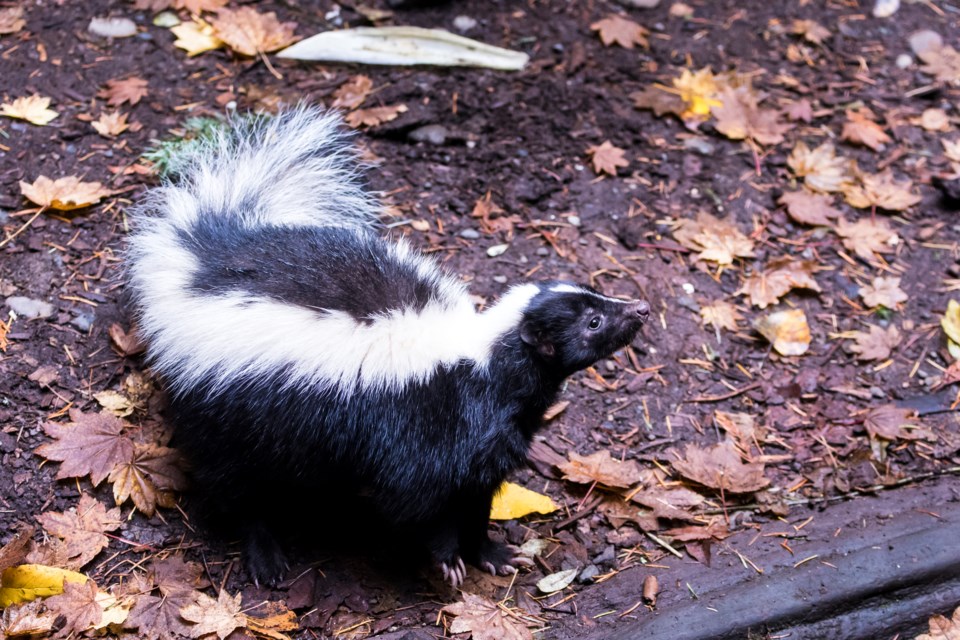Eight skunks found dead in Richmond and Vancouver in late February have tested positive for avian influenza, a highly virulent disease responsible for decimating flocks of domestic poultry.
B.C.’s chief veterinarian Theresa Burns said the skunks were initially turned over to B.C.’s Animal Health Centre under suspicions they had been poisoned in residential areas of the cities. But testing later revealed they were infected with the same strain of the H5N1 bird flu virus that has swept into farms in a series of outbreaks across the world.
Burns said this is the first time such a large cluster of H5N1-infected mammals have been found in a single geographic area.
“We're looking for signs of mammalian adaptation,” said Burns. “That will help us determine: is there increased human health risk?”
The skunks likely became infected after eating dead wild birds carrying the virus, said Burns. She repeated the Ministry of Agriculture and Food message, released in a press release Monday, that avian flu continues to pose a “low risk to human health.”
The eight skunks add to millions of wild and domestic animals that have been infected with bird flu since an international series emerged early in 2022. Since then, outbreaks have swept North America, Europe and Asia over the past year.
Half of the nearly 7.2 million domestic birds impacted by avian flu across Canada since 2022 have been identified in B.C., according to the Canadian Food and Inspection Agency (CFIA). The spread of highly-pathogenic strains had led to massive culls in farms across Canada and elsewhere. CFIA says there is no evidence to suggest eating cooked poultry or eggs could transmit one of the highly virulent strains of bird flu to humans.
Keep pets away amid ongoing investigation
A ministry lab in Abbotsford, B.C., has done post-mortem inspections on two of eight skunks so far. Samples from that lab were sent to the BC Centre for Disease Control for genomic testing, which confirmed the strain infecting the skunks was the same one running through poultry farms.
Burns said they are also still trying to track down exactly where the skunks were found, something that's expected to take two weeks. In the meantime, the Ministry of Forests is working with cities in the region to look for increased reporting of dead skunks, and Burns says her team has notified wildlife rehabilitation centres to remain alert.
The ministry is warning pet owners to keep away from dead animals. Anyone finding a dead animal should leave it where it is and contact the B.C. Wildlife Health Program at 250-751-7246.
Dead skunks part of international series of outbreaks
Avian flu occurs naturally in wild birds in the northern hemisphere. The virus can jump from wild birds into poultry flocks through shared outdoor ponds or open buildings.
Scientists have isolated variants of the influenza virus in more than 100 wild bird species worldwide, from waterfowl like geese, swans, ducks and gulls to shoreline species like sandpipers, plovers and storks, said Ronald Ydenberg, a professor of behavioural ecology and director of Simon Fraser University’s Centre for Wildlife Ecology.
“There is likely always some spillover to other species. So by itself, I wouldn't be awfully alarmed,” Ydenberg said. “But it is a signal that whatever is out there at the moment is jumping into some other species.”
The latest series of outbreaks has seen the virus jump from birds into mammals. Across the United States, H5N1 has been isolated in foxes, bears, wild cats, coyotes, seals, raccoons and opossums. Infected skunks have been found in highest concentrations across the U.S. Pacific Northwest, according to the U.S. Department of Agriculture.
In Canada, the Canadian Wildlife Health Cooperative has tracked nearly 1,800 confirmed or suspected positive cases of avian influenza in wild animals since late 2021. Those have mostly come back from a variety of bird species but have also included seals, foxes, bears and skunks.
“This is a little bit different,” said Burns of the skunks found in Vancouver and Richmond, “because we've seen multiple skunks that are in a fairly close urban region as opposed to sort of these isolated cases in rural areas.”
Vigilance suggested amid 'low risk' of human infection
At a global level, the spillover of bird flu into mammals “needs to be monitored closely,” said World Health Organization head Tedros Adhanom Ghebreyesus in a Feb. 8 press conference.
Since H5N1 first emerged in 1996, UN health agency's chief said there has been “rare and non-sustained” transmission of the virus into and between humans.
“But we cannot assume that we remain the case and we must prepare for any change in the status quo,” he added.
According to the U.S. Center for Disease Control and Prevention, human infection from bird flu can happen when the virus is inhaled or gets into a person’s eyes, nose or mouth.
Since 2020, a handful of human infections have been isolated, often after people had sustained contact with infected poultry. In November 2022, an adult in China developed an H5N1 infection and later died. And in a highly publicized recent case, a young girl in Cambodia did not survive after she was infected with a similar highly virulent strain of bird flu.
But a wider spillover into humans is less likely, said SFU's Ydenberg, who strongly suspects such an event would almost certainly occur a place like Southeast Asia, where people live in closer contact to domestic birds.
“The notable thing is that there are so few human deaths reported — at this point,” he said.


